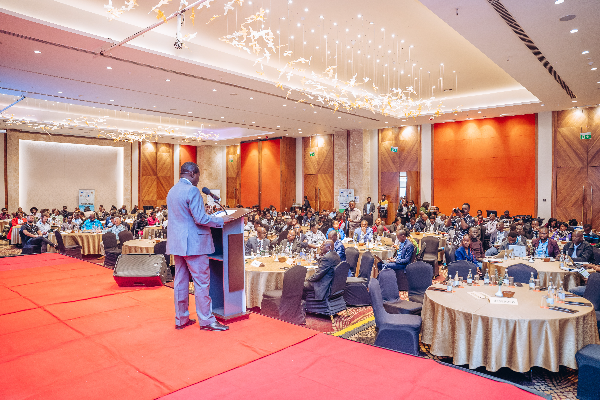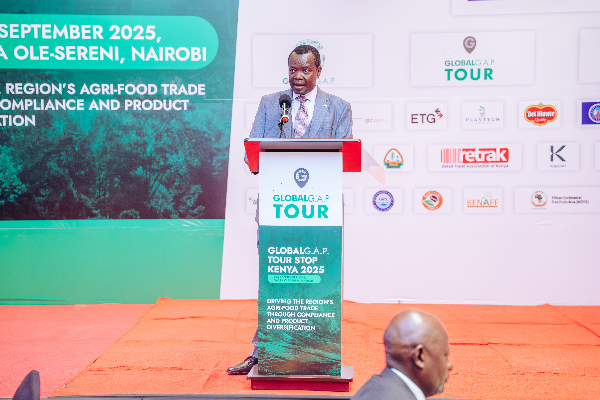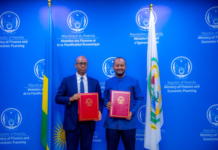The GLOBALG.A.P. Tourstop 2025 officially opened on Tuesday in Nairobi, bringing together key stakeholders from across the agri-food value chain to champion compliance, product diversification, and harmonized regulations as catalysts for farmer-led growth and regional trade expansion.
Hosted by GLOBALG.A.P and Rootooba and sponsored by European Union, TradeMark Africa (TMA), Absa Bank PLC Ltd, the International Finance Corporation (IFC) amongst other partners, the three-day event is themed “Driving the region’s agri-food trade through compliance and product diversification.” It serves as a strategic platform for dialogue, knowledge exchange, and partnership-building aimed at transforming Africa’s agricultural landscape.
Speaking on behalf of the Cabinet Secretary Lee Kinyanjui of the Ministry of Investment, Trade, and Industry, Ag. Secretary for Trade Michael Mandu emphasized the urgency of harmonizing regulations to reduce trade friction and unlock farmer-led growth. “Diversifying our agricultural and food export base is not optional—it is essential for Kenya’s and Africa’s competitiveness in a changing global trade environment,” he said.
Kinyanjui called for a bold push to increase intra-African trade from the current 12 percent to 25 percent over the next decade, citing the need for larger markets, deeper integration, and enhanced competition. He also highlighted government initiatives such as Special Economic Zones (SEZs) and County Aggregation and Industrial Parks (CAIPs) designed to support agro-processing and help micro, small, and medium enterprises (MSMEs) meet global market standards.
“Compliance is the currency of trust in agrifood trade,” said Lillian Mwai, Kenya Country Director at TradeMark Africa (TMA). “It secures shelf space in European supermarkets, retail chains in Dubai, and wholesale markets across Africa. Without it, every harvest risks rejection—and with rejection comes lost livelihoods.”
Mwai stressed the importance of diversifying product offerings to include fresh produce, oils, pastes, and dried fruits, especially as new markets such as the African Continental Free Trade Area (AfCFTA) open up, offering access to 1.4 billion consumers and a combined GDP of USD 3.4 trillion.
She also underscored the critical role of compliance and diversification in safeguarding Kenya’s agricultural jobs, incomes, and global reputation. Backed by the European Union through the Business Environment and Export Enhancement Programme (BEEEP), the initiative by TMA is focused on strengthening the mango, avocado, and vegetable value chains.
“Compliance is not just a technical requirement—it is a passport to premium markets and a shield for rural livelihoods,” said the Kenya Country Director at TMA.

The program has already trained over 5,000 farmers to meet international standards, resulting in the export of more than 100 tonnes of fresh produce in 2024. Five packhouses have achieved BRCGS certification, enabling the export of over 2,000 tonnes of vegetables and dried mangoes, while nearly 1,000 farmers are progressing toward GLOBALG.A.P. and GRASP certification, positioning them to access high-value export opportunities.
“At the heart of our dialogue lies compliance. In today’s world, access to markets is access to compliance. Buyers demand assurance — proof that produce is safe, traceable, responsibly grown, and sustainable. Certification, such as GLOBALG.A.P., is that passport. It tells a retailer in Europe or a distributor in America: “Kenyan produce meets the same standard as anything grown in your backyard.” And the fish we consume here is as much as what is fished in their waters.” Dr Charity Mutegi, Lead, Rootooba and the Host of Kenya’s GLOBALG.A.P. National Technical Working Group (NTWG).
She highlighted that the expectation is for the payoff to be immediate/obvious: certified farmers to consistently earn more, and exporters to gain direct entry into premium markets. “Compliance is not a burden — it is an investment in prosperity.” She added.
Elizabeth Wasunna, Director of Business Banking at Absa Bank PLC, emphasized the bank’s commitment to agriculture as a driver of global sustainability and economic resilience. “We view farmers not just as food producers but as nation builders,” she said, highlighting Absa’s KES 100 billion pledge to finance agriculture over five years, including KES 15 billion lent in 2024 alone. Through initiatives like SHE Business and strategic partnerships, Absa is enabling agribusinesses to scale by providing access to finance, markets, and training—while championing standards like GLOBALG.A.P. to ensure global competitiveness.
Robert Peck, Senior Operations Officer at IFC, underscored the role of financial support in enabling agribusinesses to invest in compliance infrastructure such as packhouses, cold storage, and digital traceability.
“Compliance is a catalyst for trade facilitation. Harmonized standards and streamlined procedures reduce costs and post-harvest losses while connecting smallholder-certified producers to global export opportunities,” he said.
Kenya’s commitment to export compliance is further demonstrated through systems like the National Horticulture Traceability System (NHTS) and the Pre-Export Verification of Conformity (PVoC) program, which ensure quality standards from farm to market.
As the GLOBALG.A.P. Tourstop 2025 continues over the next two days, participants will explore strategies to strengthen compliance, expand product portfolios, and build resilient agri-food systems that empower farmers and drive sustainable trade across the continent. The final day will culminate in optional field visits to selected farms and enterprises, showcasing best practices in GLOBALG.A.P.-compliant production and post-harvest handling. These tours will span both crop and aquaculture operations, giving attendees a firsthand look at how standards are applied from farm to logistics.








